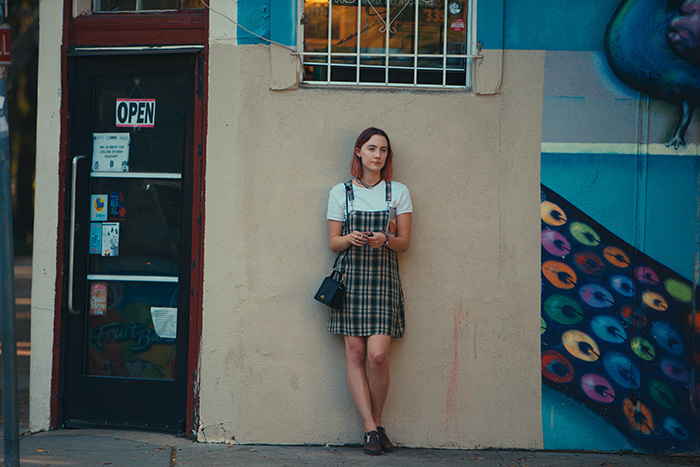
Lady Bird is about the very specific adolescent need for self-invention and self discovery. In the case of Christine McPherson (Saoirse Ronan), a senior at a Catholic girls’ school in Sacramento, that need manifests in many forms. There’s her dyed hot pink hair. There’s her self-christened nickname, Lady Bird. There’s her role in the school play (before senior year, she didn’t even know her school had a drama department). There’s her interest in becoming a mathlete (“But math isn’t something you’re terribly strong in,” the head nun, played by Lois Smith, says charitably. “That we know of—yet,” Lady Bird replies). There’s a thought that maybe she might want to have sex with one of two boys she’s involved with: the impossibly sweet Danny (Lucas Hedges) and the performatively antiestablishment Kyle (Timothée Chalamet).
But mostly, Lady Bird defines herself by what she’s definitely not: She’s definitely not the kind of person who lives in Sacramento (she wants to go to the East Coast—“where writers live”). And she’s definitely not her hard-working, devoted-but-exasperated mother, Marion (Laurie Metcalf). Except that maybe she is.
One of the funny and endearing things about Lady Bird is the fact that Marion and Lady Bird are much more alike than either is willing to admit. In the first scene, they’re both crying at the ending of a book on tape (a literal tape—the film is set in 2002). In another scene, they break off mid-fight at a thrift store to mutually gush over a dress that Marion has discovered. And they share a love for going to fancy real estate open houses and pretending to be buyers.
The real estate thing is not incidental—the McPhersons live on the wrong side of the tracks (literally, as Danny notes with sheepish astonishment). They are struggling middle class. Lady Bird’s dad, Larry (Tracy Letts), has recently been laid off; Marion works as a nurse; Lady Bird’s older brother Miguel (Jordan Rodrigues) still lives at home, along with his girlfriend (Marielle Scott), who has been kicked out of her own home. The lack of money comes up again and again—Marion is tired, over-extended, stressed about the bills, and has to deal with a daughter who’s constantly rolling her eyes at her.
And yet, Lady Bird is mostly a happy film. The family problems are real, but relatively minor. We sense that they all love each other—Lady Bird has a particular simpatico with her dear, sad-sack dad. Lady Bird deals with some traditional teenage angst—a fight with her best friend, Julie (lovable Beanie Feldstein); college rejection letters; a boy who acts like a jerk—but mostly her life is pretty good.
With its smart, snarky, anti-suburbs heroine—and a strong female friendship at its center—Lady Bird will remind some people of the great Ghost World. But the film it reminded me most of was Pretty in Pink, which first-time director Greta Gerwig—the actress best known for Frances Ha and 20th Century Women—is clearly paying homage to (there’s even a scene where Lady Bird wears a pink prom dress). Still, much as I adore Pretty in Pink, it was clearly directed by a man—its gaze was respectful, but awestruck, like the mystery of teenage girls was still a thing it was puzzling and marveling over. But Gerwig knows Lady Bird inside out (the film is rather explicitly autobiographical). The film gives her total agency.
It’s no secret that I haven’t always loved Greta Gerwig as an actress; I find her a bit too “la-di-da,” for lack of a better term. That’s why Ronan is so perfect here as a Gerwig surrogate. There’s nothing flighty about her; she anchors Gerwig’s more fanciful instincts with her grounded sensibleness. Even when Lady Bird makes mistakes, we know that the kid is going to be alright.
The great New York Times film critic A.O. Scott called Lady Bird “perfect.” I wouldn’t go that far. A character of a depressed drama teacher (Stephen Henderson) seems to just disappear, mid-film. (His absence is sort of explained, but one gets the strong sense that more of his story was left on the cutting room floor.) Lady Bird’s fight with Julie also feels a little undercooked. And finally, there’s the near disastrous ending, where Lady Bird gets the kind of perspective on her hometown and empathy for her mother that 18 year old girls simply don’t get (but 34-year-old filmmakers might). Still, this is a promising debut for Gerwig. She teases great performances from her entire cast—Metcalf, in particular, is a knockout—and has obvious affection for her characters, even the ones who sometimes act like jerks. If Gerwig’s cinematic brand is going to be tenderness, feminism, spiky humor, and empathy, count me in.
